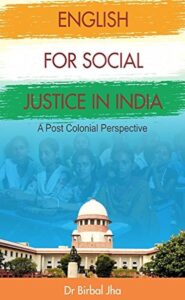Celebrating the Brilliance of “English for Social Justice in India”: A Tribute to Birbal Jha’s Vision
Serious readers often value books that address contemporary issues and social concerns. A book on English for Social Justice explores the intersection of language, power, and social inequality, making it relevant to readers who are interested in understanding and addressing these issues.
In the realm of literature and education, certain works stand out not just for their content, but for the profound impact they have on readers. Dr. Birbal Jha’s “English for Social Justice in India” is undoubtedly one such masterpiece that has garnered widespread praise and admiration for its enlightening content and powerful message. Recently, a reader named Pushpa Prakash who hails from Patna, shared her heartfelt appreciation for the book, echoing the sentiments of countless others who have been deeply moved by Jha’s work.
In Pushpa Prakash’s words, “I was sitting to have a glance at the book – English for Social Justice in India. But when I started to read, I had read ten pages at one go,” encapsulate the captivating nature of Jha’s writing. It is a testament to his ability to draw readers in from the very first page and keep them engaged throughout. His writing possesses a seamless flow that makes it impossible to resist immersing oneself in the narrative.”

What sets “English for Social Justice in India” apart is its profound exploration of the role of language, particularly English, in perpetuating or challenging social injustices. Jha delves deep into the complexities of language and power dynamics, shedding light on how language can be both a tool of oppression and a vehicle for social change. Through meticulous research and insightful analysis, he presents a compelling case for using English education as a means to promote social justice and empower marginalized communities.
Pushpa Prakash further expresses her admiration for the book by stating, “There is a flow in writing, no one can hold back to immerse in it.” This sentiment resonates with readers who have found themselves drawn into Jha’s narrative, unable to put the book down until they have absorbed every word. Jha’s writing style is not only captivating but also thought-provoking, prompting readers to reflect on their own beliefs and attitudes towards language and social justice.
Moreover, Pushpa Prakash acknowledges the inner beauty she discovered while reading the book, a testament to Jha’s ability to inspire and uplift his readers. Beyond just imparting knowledge, “English for Social Justice in India” touches the hearts of its readers, leaving a lasting impression that extends far beyond the pages of the book.
![]()

In conclusion, Birbal Jha’s “English for Social Justice in India” stands as a shining example of the transformative power of literature and education. Through his insightful exploration of language and social justice, Jha has not only enlightened minds but also inspired hearts. As Pushpa Prakash aptly puts it, “Hats off to your hard work. I feel honoured that such a great person is with me.” Indeed, we are privileged to have scholars like Birbal Jha who dedicate themselves to creating a more just and equitable society through their work.

